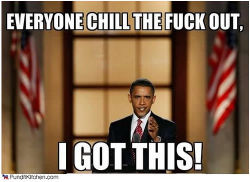In 1933 Franklin Roosevelt called fear our greatest fear. Two generations later George W. Bush said it was terrorism.
Today what we have most to fear is cynicism.
I say this reluctantly since journalists see cynicism as our stock in trade. Even a 23-year old journalist can sound like a 60-year old seen-it-all hack after a few press conferences or city council meetings, and does.
Skepticism is different, and it's really the stance journalists should be taking. Skepticism says, "prove it." Cynicism says "you can't prove it." Skepticism says "you might be trying to pull a fast one." Cynicism says "you're definitely trying to pull a fast one."
Cynics may ultimately be right, since in the long run we're all dead, as Keynes said. (Well, you are. My mom says she's going to be the exception and at 86 I take her at her word.) But cynicism, when applied to events, is a terribly destructive force.
Cynicism may be the most important legacy the Nixon Thesis gave this country. Nixon was a crook, Ford pardoned him, Carter showed that an honest man can't succeed, and Reagan that ignorance is bliss. By the Clinton years (more appropriately by the Seinfeld years) we had all internalized this to the point where it was our default reaction to everything. Neither the President nor his critics gave us cause to believe any differently than Seinfeld's George Costanza.
George W. Bush used this cynicism to nearly destroy America. We had seen it all, so Bush gave us so many enormous crimes, such brazen crimes, that many of us ceased to believe in anything but crime.
But Barack Obama has a different message, and while most of us voted for that message we still haven't internalized it.
The message is simple. Believe in yourself. Believe in your neighbors. Believe that change and hope are possible. Just words, and easy to dismiss as mere rhetoric, but if we do that then we, and he, will both fail.
And we'll be left with just cynicism.
In the War Against Cynicism the media is the obvious villain, but there's another villain we have to face and defeat first. You will see him or her in the mirror tomorrow. We have to believe that change is possible in our own lives, that we can make that change, that the obstacles in front of us can be overcome, before we can do anything.
In these last 8 years I have been blessed with many great examples of how believing can, despite the odds, keep you going forward. In this regard I especially want to mention my friend Jeff Vick, an entrepreneur.
An entrepreneur is a very special person. They must be an optimist. They are not a small businessman, they are always building a big business, a great business. And here's how you can tell the real ones from the fakes — when they succeed they immediately leave and start again.
Jeff and I started as business associates, but his real benefit to me has been his example. He doesn't quit. He keeps working a problem — whether it's a technical problem, a personal problem, a funding problem or a sales problem — until he succeeds. When one angle fails he tries another, and another, so that the business he comes out with may look nothing like what he set out to build, but it works. It makes money.
We all need that kind of attitude right now. We need to believe in ourselves, and believe we can solve our problems. We need to keep finding new angles to approach our problems, and we need to keep working.
We know that's true intuitively. That's why so many people respond to the President. But there are so many people, regardless of their politics or profession, who feel it's cooler and easier to tear down, to question based on the assumption that a fast one is always being pulled. They are not being useful.
I know that after 8 years of Bush, and Enron, and Katrina, and Madoff, and all the rest, I'm asking something big here. But look at today's world. Compare your life to the lives your grandparents lived. Compare it to the lives of people who live in places where corruption or war make an entrepreneurial attitude seem truly ridiculous.
That world wasn't built by cynicism. It was built by belief.
We stand, in fact, on a mountaintop. And if there are other mountains before us we are experienced. We will get over them the way we got over the others, by first taking one step. And by believing that success is possible.












Yes. A major difference. In a novel called “The Curse of Chalion”, a young man comments on his father, whose nickname everywhere is The Fox, “I’ve never known him to be cheated. I’ve seen him cheat himself.” Long live honest I’m-from-Missouri skepticism!
Yes. A major difference. In a novel called “The Curse of Chalion”, a young man comments on his father, whose nickname everywhere is The Fox, “I’ve never known him to be cheated. I’ve seen him cheat himself.” Long live honest I’m-from-Missouri skepticism!